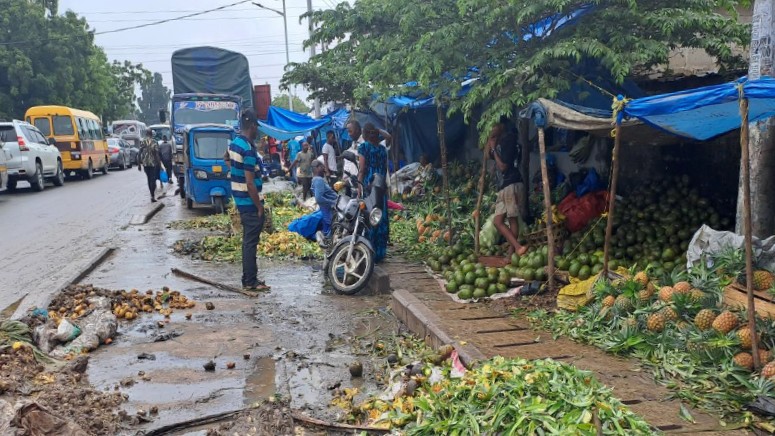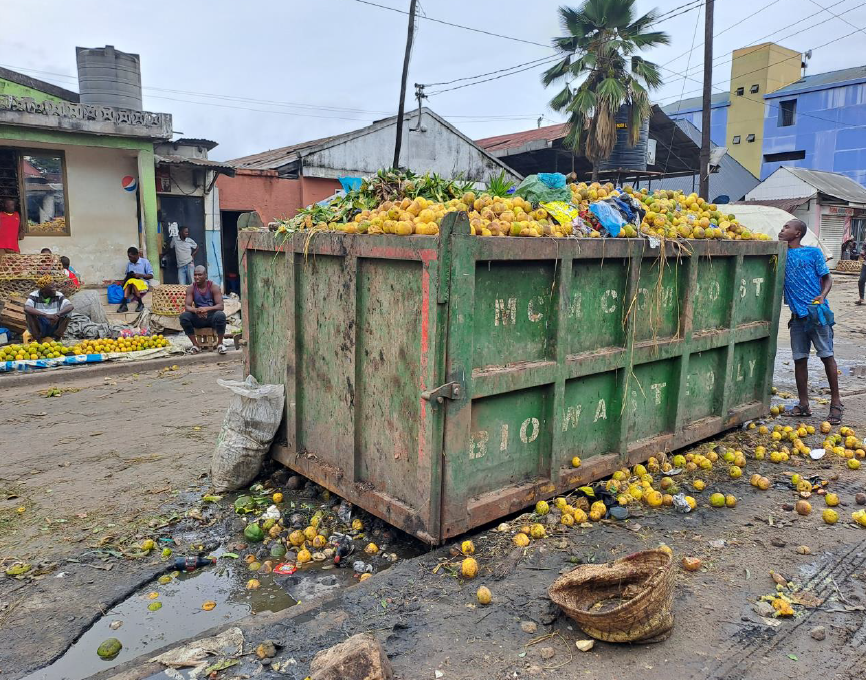
A team from the Green Cities and Infrastructure Programme (GCIP) have been studying fruit and vegetable markets in Dar es Salaam, Tanzania, where there is little formal provision for the collection, treatment and disposal of waste. Between January and March 2024, the team, led by solid waste management expert Dr Mansoor Ali, spoke with more than 50 stakeholders, including municipal staff and contractors and the manager of the city’s composting plant. They observed waste collection and disposal practices within the markets and also gathered 20 best practice case studies from other African cities.
The bulk of the market waste in Dar es Salaam is organic and biodegrades quickly. Depending on the method of disposal, however, this can generate methane – a powerful greenhouse gas which contributes significantly to climate change. But composting food waste minimises methane emissions and produces a valuable product. It can also reduce waste, which needs transportation and clogs the water courses. Applying compost to agricultural fields improves soil stability and makes the land more resilient to climate shocks such as drought. Currently, Dar es Salaam has one substantial composting plant; a second plant is being planned, which will increase city-wide capacity to around 110 tons per day.
As well as the implications for climate mitigation and resilience, there are also important social development aspects to GCIP’s research. For example, a high number of informal workers are involved in the city’s waste management system, and municipal waste collectors work long hours with little protective clothing. Furthermore, unsanitary conditions in the markets mean that they are not welcoming spaces for many buyers – particularly women, girls and disabled customers. These barriers to access can impede these groups from purchasing food.
Innovation within the informal sector

One insight gained through this study was the scale and nature of the informal waste collection sector. The team estimated that at least 50,000 people work informally on waste in Dar es Salaam – comprising between 1 and 2 per cent of the total urban workforce. Some buy specific materials, such as plastic, cardboard or metals, to reuse or further sale.
There are also groups that purchase food waste from restaurants to feed animals, including livestock and zoo animals. This was a new finding for Dr Ali. “I've worked in the area of waste for almost 40 years and I didn't know about the purchasing of the food waste that takes place in Dar es Salaam,” he said. “We found a number of groups who go to the restaurants and buy food waste to feed their animals. That was entirely new. So I think in a way we are very close to breaking mindsets and the orthodoxy in this topic because we're bringing new findings to the table.”
Importantly, this informal entrepreneurial work reduces waste that must be collected and processed by the Tanzanian Government, saving money and resources while supporting the resilience of the city. But despite their numbers, the informal workers are often forgotten by development projects, explains Dr Ali – an approach that GCIP seeks to avoid.
“Waste improvement projects often forget about the human face of the work. We were very insistent that the waste workers who are employed by the municipalities should not be ignored. We said – no, they're very important. There are many of them – hundreds of them – working there, and the conditions are very poor.”
Looking ahead
"In Dar es Salaam, a number of organisations are already doing good work which is very important for the city."
Dr Mansoor Ali
Among other topics, we are hoping that Phase 2 of GCIP’s Targeted Offer will focus on removing barriers for the waste pickers so that they can scale up their work. It will also seek to influence the approach to large-scale investment, ensuring the consideration of citizens’ rights, and that the benefit is felt in the most vulnerable areas. Around 7 million people live in Dar es Salaam, of whom more than 70 per cent are in informal settlements. Dr Ali hopes that future infrastructure investments will support these areas, rather than benefitting only high-income neighbourhoods.
The time spent observing the markets and consulting with stakeholders has built solid foundations to expand GCIP’s work into a more participatory approach. The team is not looking to “reinvent the wheel”, says Dr Ali, “In a city like Dar es Salaam, a number of organisations are already doing good work. We found that some of them are doing scalable work and some of them are doing that local work which is very important for the city.”
A holistic approach for equitable results
Working across Dar es Salaam’s large and medium-sized markets, Phase 2 has the potential for a series of long-term impacts. More immediate results include cleaner markets, improved food safety and a reduction in food waste. There is also the potential for the greater availability of food, particularly for those who are struggling, through the creation of food banks. Farmers and smallholders will also benefit from the provision of high-quality compost.
Tanzania has good policies on organic waste, food waste and recycling, and Dar es Salaam has a climate action plan developed with support from C40. However, due to a lack of resources, capacity and awareness, as well as misallocation of resources, the city is not currently able to deliver the plan or implement the policies. GCIP will therefore work closely with the municipalities to influence decision making around market waste, establishing effective and inclusive waste management systems and improving the working conditions for employees. The team also hopes for greater recognition of the informal sector and its role in waste disposal.
It is critical to build capacity and knowledge around gender equality, disability and social inclusion, and the links between waste and climate change. Any attempt to overhaul the way that waste is dealt with must be truly holistic – integrating the systemic, technical and cultural considerations that are intrinsic to Tanzania’s fruit and vegetable markets.
---
Dr Mansoor Ali spoke about GCIP’s work on fruit and vegetable market waste in a webinar for Be Wastewise on 22 May. The recording is available here.
The UK’s Green Cities and Infrastructure Programme will accelerate the delivery of sustainable green cities and climate-resilient infrastructure – tackling climate change and ex
Published
20/05/24
